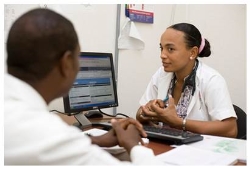The EMR iSanté enables research on population health in Haiti, including the implementation of Option B+. This work was presented at the International AIDS Society Conference in 2015 Continue reading “Layering Research and Practice in Haiti”
Category: Haiti
Workforce Development in Haiti
It is critical that health care providers receive the necessary training to empower them to improve patient outcomes CHARESS supports both pre-service and in-service training efforts in Haiti. In particular, CHARESS is a key partner of MSPP in maintaining its national clinical guidelines. Continue reading “Workforce Development in Haiti”
Scott Barnhart

Scott Barnhart, MD, MPH, has an extensive background as Professor of Global Health and former Director of Global Health Programs for I-TECH at the University of Washington. He has had responsibility for leading nine country offices, projects in 14 countries, and more than 500 staff. This experience and training has included extensive clinical work, research and program management in pulmonary and environmental and occupational medicine, and more than eight years as Medical Director of a safety net/Level 1 Trauma Center hospital.
Ensuring health systems can quickly detect and respond to emerging health threats is a critical challenge in both domestic and global health. Dr. Barnhart’s major implementation projects include scale-up of voluntary medical male circumcision (VMMC) in Zimbabwe and Malawi, OpenMRS, and laboratory information systems. Dr. Barnhart deploys his expertise in multiple African countries and Haiti to strengthen health systems and health care.
A goal of Dr. Barnhart’s work is to promote country-led, country owned sustainable development. Consistent with the principles of the Paris Declaration, the goal is to transition the bulk of development work and the associated leadership, ownership, technical direction and control of funding into the countries where development occurs. This approach ensures that the entire continuum of skills necessary for development (technical expertise, administration (human resources, operations, and management and accountability for funds) is transitioned to local partners. A key indicator is to have 75% or more of a grant’s funding expended in-country on local programs and local citizens and to support the local economies in these highly resourced constrained countries. Dr. Barnhart has worked closely to advance this model through projects in Haiti with a goal to shift the majority of a project to a local organization and in Zimbabwe where the VMMC program is largely run through local partners.
Program Highlights
Health Information Systems in Haiti
Electronic medical record (EMR) systems have the capacity to improve clinical decision making and quality of care at site level but can also be leveraged to make data-driven, population-level public health decisions. At the request of the MSPP Continue reading “Health Information Systems in Haiti”
Continuous Quality Improvement in Haiti
In partnership with CDC, CHARESS helps the Haitian MSPP to implement the national care improvement program, HealthQual, by training providers on quality improvement concepts and using data from the EMR, iSanté, for clinical decision making and improved care. Continue reading “Continuous Quality Improvement in Haiti”
Clinical Mentoring in Haiti
I-TECH introduced its clinical mentoring program in Haiti in 2006. A team of physicians, nurses, and psychologists provide technical assistance to 20 sites in the MSPP care and services network to help strengthen HIV- and AIDS-related services. During site visits, CHARESS mentors conduct clinical rounds Continue reading “Clinical Mentoring in Haiti”
New Evaluation Highlights Benefits of iSanté to Care and Treatment

For a decade, the iSanté electronic medical record system and OpenELIS lab software, developed by the International Training and Education Center for Health (I-TECH), have allowed health care providers to document HIV patient care and patient care histories.
A recent evaluation, “Report on Best Practices in ‘Point of Care’ Implementation of iSanté and OpenELIS Data Systems,” has expanded the current knowledge of iSanté’s use at point of care (POC) as well as highlighting the benefit of iSanté use to care and treatment.
The evaluation also identifies strengths and challenges in POC use of the iSanté and OpenELIS systems in clinics and hospitals in Haiti, in order to guide improvements in the quality of I-TECH’s technical assistance.
The move to point of care
Until 2012, most sites used iSanté primarily to capture data that providers had recorded on paper forms. In 2012-13, with impetus from the Haitian Ministry of Health and funders, I-TECH supported some iSanté sites to move toward POC implementation.
This involves providers using iSanté during patient visits to enroll patients, review health history, capture clinical assessments and treatment plans, and record drug and laboratory orders.
Evaluation shows positive impact
Through in-depth interviews and focus group discussions with hospital personnel, I-TECH was able to grasp the positive impact of iSanté POC system use has on care and treatment.
Facility personnel at all levels were satisfied with the transition to POC system use. All five sites evaluated reported increases in provider confidence and improved human resource management, citing reduced provider workload and more effective use of provider time.
Personnel also perceived a number of positive effects of system use on productivity and quality of care including benefits to patient experience (reduced wait times) and service quality.
I-TECH Shares Research at CUGH 2015
On March 26-28, Boston University will host the Sixth Annual Consortium of Universities for Global Health (CUGH) Conference.
The theme of this year’s conference is “Mobilizing Research for Global Health,” and featured speakers include Olusoji Adeyi, Director, Health, Nutrition and Population, World Bank; Paul Farmer, Co-Founder, Partners in Health; and Stephen Morrison, Vice President, Center for Strategic and International Studies.
Staff members from the International Training and Education Center for Health (I-TECH) will attend to present research on several topics:
Malawi
- Quality improvement practices decrease adverse event rates in a surgical male circumcision program in Malawi
Kohler PK, Chilongozi DA, Namate D, Barr BA, Msungama W, Phiri O, Tenthani L, Chalulu K, Perdue T, Barnhart S, Krieger JN
- Improving nursing and midwifery clinical education by developing local faculty mentoring capacity in Malawi
Holman J, Muyaso M, Msiska G, Namate D, Wasili R
Haiti
- An assessment of data quality in Haiti’s multi-site electronic medical record system
Puttkammer N, Baseman JG, Devine EB, Hyppolite N, France G, Honoré JG, Matheson AI, Zeliadt S, Yuhas K, Sherr K, Cadet JR, G. Zamor, Barnhart S
Kenya
- Evolution of the KenyaEMR training program: Towards efficiency and quality in scale-up
Atelu C, Antilla J, Muthee V, Puttkammer N
About CUGH
Founded by leading North American university global health programs, CUGH aims to:
- Define the field and discipline of global health;
- Standardize required curricula and competencies for global health;
- Define criteria and conditions for student and faculty field placements in host institutions;
- Provide coordination of projects and initiatives among and between resource-rich universities and less-developed nations and their institutions.
CUGH is dedicated to creating balance in resources and in the exchange of students and faculty between institutions in rich and poor countries, recognizing the importance of equal partnership between the academic institutions in developing nations and their resource-rich counterparts in the planning, implementation, management and impact evaluation of joint projects.
Haiti’s Electronic Medical Records System iSanté Proves Useful Tool to Improve Patient Outcomes

For nearly a decade, iSanté has allowed providers to share information among care team members and health professionals.
Over the past several years, the U.S. President’s Emergency Plan for AIDS Relief (PEPFAR) has invested heavily in health systems and clinical data analyses in low-income countries around the world, in its efforts to support the care and treatment of those affected by HIV and AIDS.
With the support of PEPFAR, through the Health Resources and Services Administration (HRSA), in 2005, the International Training and Education Center for Health (I-TECH), together with Haiti’s Ministère de la Santé Publique et de la Population (MSPP) and the U.S. Centers for Disease Control and Prevention (CDC), developed and implemented iSanté — an electronic medical record system to capture and report information on patients living with HIV and AIDS.
For nearly a decade, this system has allowed providers to document HIV patient care, look up patient care histories, and share information between care team members and health professionals.
The MSPP has been particularly concerned with patient adherence to antiretroviral therapy (ART) and treatment failure due to a number of factors, including the 2010 Haiti earthquake. While iSanté has gotten kudos in Haiti for storing and linking patient data, three recent papers, lead-authored by I-TECH Research and Evaluation Advisor Nancy Puttkammer, have illustrated the potential of using this data source to identify and help solve the challenges of adherence and patient attrition.
- “Before and After the Earthquake: A Case Study of Attrition from the HIV Antiretroviral Therapy Program in Haiti,” published in Global Health Action in August 2014, compared attrition from the national HIV ART program at two large public-sector hospitals where I-TECH works. One site was less than 30 km from the epicenter of the devastating earthquake of January 2010, while the other site was outside of the area strongly affected by the earthquake. Surprisingly, the paper showed that attrition improved after the earthquake in the site closest to the epicenter. This finding underscores the resilience of patients and providers, and contributes evidence that it is possible to maintain continuity of HIV services even in the context of a complex humanitarian emergency.
- “Development of an Electronic Medical Record Based Alert for Risk of HIV Treatment Failure in a Low-Resource Setting,” published in PLOSOne in November 2014, shows that ART-dispensing data and other data contained in iSanté can be used to estimate patients’ adherence to their medications and predict the patients most likely to experience ART treatment failure in the future. Having an alert to signal patients with high risk of future treatment failure could help providers better target counseling and other adherence support.
- “Patient Attrition from the HIV Antiretroviral Therapy Program at Two Hospitals in Haiti,” currently in press at the Pan American Journal of Public Health, examines ART attrition at the same two hospitals, during the period 2005-2011. The study found higher risk of attrition among patients who lived farther away from the hospital, who started on non-standard ART regimens, who did not receive ART adherence counseling before initiating ART, and who rapidly started ART following their enrollment in HIV care and treatment. The findings suggest opportunities for several quality improvement interventions at the two hospitals.
“This research has provided a valuable contribution in documenting health outcomes and encouraging improvement in the ART program in Haiti,” says Dr. Scott Barnhart, Professor of General Internal Medicine and Global Health at the University of Washington. “We are at the dawn of translating large investments in EMRs into useful data for improving the care of patients, as well as supporting important pub
I-TECH Presents at CUGH 2014
I-TECH staff will head to Washington, D.C., this week to the Fifth Annual Consortium of Universities for Global Health (CUGH) Conference, which will take place at the Washington Hilton from May 10-12. More than 1,300 participants from 50 countries are expected to attend the conference, co-hosted by the George Washington University and Stanford University.
This year’s theme is “Universities 2.0: Advancing Global Health in the Post-MDG Era,” and I-TECH teams will present on forward-looking topics ranging from the implementation of electronic medical records to partnership with the U.S. President’s Emergency Plan for AIDS Relief (PEPFAR).
Confirmed speakers include President of the World Bank Jim Kim; former Head of UNAIDS and current Director of the London School of Hygiene and Tropical Medicine Peter Piot; and Head of the Earth Institute at Columbia University Jeff Sachs. Dr. King Holmes, I-TECH Principal Investigator and 2013 Gairdner Global Health Awardee, will also speak at CUGH’s Gairdner Lecture on May 12.
For those planning to attend the conference, don’t forget to check out the University of Washington Department of Global Health table — and to stop by the I-TECH presentations, listed below.
Kenya
- Electronic Medical Record (EMR) Implementation at Scale in the Public Health Sector: Lessons Learned in Kenya
Haiti
- Using an electronic medical record system to identify factors associated with attrition from the HIV antiretroviral therapy program at two hospitals in Haiti
- Before and After the Earthquake: A Case Study of Attrition from the HIV Antiretroviral Therapy Program in Haiti
South Africa
- Successes and challenges in liaising with PEPFAR partners and stakeholders in the TB/HIV Management Program
- Evaluation of a comprehensive HIV prevention program in North West Province, South Africa: results from the pilot
- Integrating research into program design: Conducting a situational analysis to inform comprehensive HIV prevention and care in North West Province, South Africa
- Mystery patients: Training actors to serve as unannounced standardized patients to evaluate training outcomes for sexually transmitted infections in South Africa
Lab Leadership and Management
- Certificate Program in Clinical and Public Health Laboratory Leadership and Management
Contact Anne Fox in Communications to see any of these completed posters.
About CUGH:
Founded by leading North American university global health programs, CUGH aims to:
- Define the field and discipline of global health;
- Standardize required curricula and competencies for global health;
- Define criteria and conditions for student and faculty field placements in host institutions;
- Provide coordination of projects and initiatives among and between resource-rich universities and less-developed nations and their institutions.
CUGH is dedicated to creating balance in resources and in the exchange of students and faculty between institutions in rich and poor countries, recognizing the importance of equal partnership between the academic institutions in developing nations and their resource-rich counterparts in the planning, implementation, management and impact evaluation of joint projects.
The Bill & Melinda Gates Foundation provided the leadership and funding to plan this consortium. The Rockefeller Foundation provided a grant to help develop the organizational structure of CUGH in its first year of existence.

